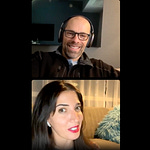Near the end of Dispatches - Michael Herr’s memoir of his time as a war correspondent in Vietnam - he writes of his fellow journalists, “A few extreme cases felt that the experience there had been a glorious one, while most of us felt that it had been merely wonderful.” Merely wonderful. It’s a perfect sentence that could only come at the end. If you start a war memoir that way, readers will think you’re insane and toss it aside. But after the previous 250 pages, the sentence lands like a revelation.
I thought of that line after reading Jane Ferguson’s memoir, No Ordinary Assignment, and more so after speaking with her on the podcast. Jane, currently the Ferris Professor of Journalism at Princeton, wrote the book in answer to the question, why’d she become a war correspondent? There’s something of Herr in the answer, but also far more. Consider that Dispatches spanned his two years covering Vietnam for Vanity Fair from 1967-1969. Jane’s memoir covers more than a decade of reporting for al-Jazeera, CNN, The New Yorker, and PBS in Somalia, Yemen, Syria, Sudan, Iraq, and Afghanistan. In other words, more than five times as many years and five times as many wars.
It is a striking fact that so many war correspondents, soldiers, and diplomats grew up in the War on Terror. Afghanistan lasted for a generation, and wars came and went around it the entire time. They come still. In Jane’s case, she was 25 when she first travelled to Mogadishu and just shy of her 37th birthday when she covered the fall of Kabul. She also was born and raised in Northern Ireland toward the end of the Troubles. It all gives her an interesting view back into America; a lens which informs her view of US power around the world, our national division at home, and the role of the media through it all.
The result is a severe distaste for moralizing and certainty. Covering all the angles of all those wars over all these years is to see a great many perspectives. Whether you seek to explain the world or change the world, you have to meet the world as it is, not as you want it to be. Filtering the world through the Manichean view of critical theory is as dangerous and absurd as tuning it out entirely.
In Jane’s view, the tenuous global moment in which we now find ourselves can be traced to Syria in 2013 when Bashar al-Assad launched a sarin gas attack that killed 1,000 people. President Obama had previously called the use of chemical weapons in Syria “a red line,” but failed to respond after the attack. Jane says, “This was when the liberal world order shook.”
Jane believes that the great tragedy of the West since then has been its failure to respond to increasingly massive humanitarian disasters. The wars in Ukraine and Israel come after years of conflict in Yemen and Syria (and the disaster wrought in Afghanistan after our withdrawal) where untold hundreds of thousands of people have been killed or died from secondary causes; wars that have received very little international or diplomatic effort.
But from this lack of moral conviction at war, we see the extreme opposite at home. Here, we “have this extraordinary sort of moral clarity” that’s very useful in simplifying the world into good and bad, and excusing you from having to see the other side. Why bother when they’re deplorable?
I teach at one of the most elite universities in the world (and) a lot of people presume I have the same viewpoints as them. And so I'm always a foreign correspondent, I'm always kind of like sitting around and people would say something to me… and forget that I'm just this little redneck from Ireland. And so they'll be like, well, you know, all of those people who vote for Trump, I mean, they're just bad people… it's just so interesting to me… how much prejudice is permissible when we decide we’re morally better.
And this is so much of what informs Jane’s work with her students at Princeton.
I think part of the problem that needs to be solved is separating opinion from news. And I know that sounds sort of obvious and on the nose, but that's sort of where this all went wrong. We had a lot of young people come up thinking that journalism is actually like activism, and journalism is advocacy, and it's using your platform to say something, and it's trying to make a difference, and it's actually none of those things. And actually it's antithetical to any of those things.


